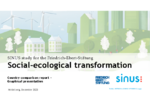Energize it, industrialize it and make it work
Foresighted structural policy is needed to ensure that Europe can assert itself in tomorrow’s tough international competition for key industries, safeguarding prosperity and providing decent jobs. The market alone will not suffice. A protective, guiding and future-oriented state is the essence of social democracy.
We shall serve as a platform for strategic exchange between industrial and energy policy and learning from the experiences of others.
On Energy, Industrial & Structural Policy
Europe's energy transition: Women's power in solving the labour bottleneck
Employment opportunities and requirements for low-carbon job markets
EU climate targets will not be reached without an accelerated roll-out of renewables and clean-tech. Already today labour and skill shortages are worrisome in the (clean) energy sectors. They will grow further without adequate policy tools and hamper a speedy decarbonisation. An often overlooked fact is the energy sector workforce presenting a gender gap greater than in most other sectors.
Our new publication assesses the scale of skills needed in the energy sector in the years to come and analyses obstacles to female employment in this sector. It gives best practice examples and elaborates recommendations for attracting and keeping female workers in the energy labour markets. Decent and flexible working conditions for both women and men are part of the solution. They increase also quality of the output. Europe’s energy and clean-tech sectors urgently need the women’s power to face skill and labour market gaps and speed up the transition.
The study is authored by Irene Giner-Reichel and Maria van Veldhuizen from GWNET, Global Women's Network for the Energy Transition.
All News & Events
Europe's energy transition: Women's power in solving the labour bottleneck
Employment opportunities and requirements for low-carbon job markets
EU climate targets will not be reached without an accelerated roll-out of renewables and clean-tech. Already today labour and skill shortages are worrisome in the (clean) energy sectors. They will grow further without adequate policy tools and hamper a speedy decarbonisation. An often overlooked fact is the energy sector workforce presenting a gender gap greater than in most other sectors.
Our new publication assesses the scale of skills needed in the energy sector in the years to come and analyses obstacles to female employment in this sector. It gives best practice examples and elaborates recommendations for attracting and keeping female workers in the energy labour markets. Decent and flexible working conditions for both women and men are part of the solution. They increase also quality of the output. Europe’s energy and clean-tech sectors urgently need the women’s power to face skill and labour market gaps and speed up the transition.
The study is authored by Irene Giner-Reichel and Maria van Veldhuizen from GWNET, Global Women's Network for the Energy Transition.
Contact
Friedrich-Ebert-Stiftung
Climate and Social Justice
Cours Saint Michel 30e
1040 Brussels, Belgium








